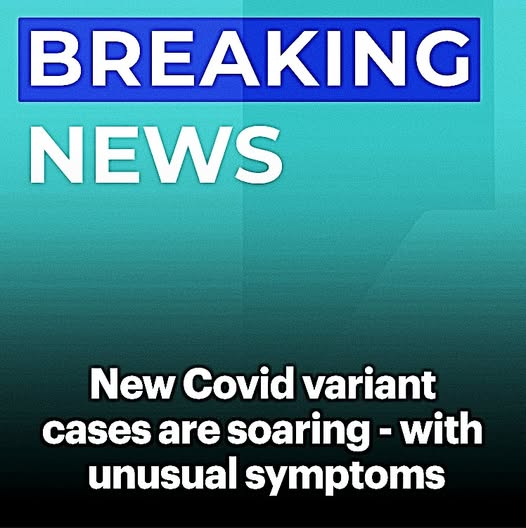Two recently identified COVID-19 variants — informally named Nimbus and Stratus — are fueling a new wave of infections across the UK and the US. Medical experts are cautioning that symptoms may present differently from those seen with earlier strains.
A croaky, hoarse voice and an intense, “razor-blade” sore throat have emerged as two of the most notable signs of these variants, officially designated NB.1.8.1 (Nimbus) and XFB (Stratus). Both are sublineages of Omicron, yet specialists note that they spread more rapidly and exhibit slightly altered symptom patterns compared to previous versions of the virus.
A Sharp Rise in Cases
The UK Health Security Agency (UKHSA) reports national positivity rates rising from 7.6% to 8.4% in a week — a marked increase as autumn turns to winter. Hospital admissions also climbed from 2.0 to 2.73 per 100,000 people, the steepest spike since early summer.
Across the United States, similar trends are evident. The Centers for Disease Control and Prevention (CDC) indicate that COVID-19 levels in wastewater — a key measure of community spread — are now “moderate” nationwide. Several Northeastern states, however, are registering “very high” concentrations, suggesting the possibility of another winter surge.
The Tell-Tale Symptoms
Patients infected with Nimbus or Stratus are describing a distinctive range of symptoms.
Dr. Aaron Glatt, an infectious disease expert in New York, told Today.com:
“Patients report a sore throat that feels like it’s lined with razor blades. It’s intense and often the first sign they notice.”
Other common symptoms such as headaches, congestion, fatigue, coughs, and muscle aches remain, but the throat pain and hoarseness are particularly pronounced with these subvariants. Some individuals even lose their voice temporarily, even if other symptoms are mild.
Despite higher transmissibility, health authorities emphasize that Nimbus and Stratus are not considered more likely to cause severe illness than previous Omicron strains. Their spread may be faster due to subtle mutations allowing partial evasion of immunity from vaccines or prior infections.
Vaccination Campaign Intensifies
Responding to rising case numbers, the UK has launched its winter vaccination program earlier than usual. Millions are being encouraged to book updated COVID and flu vaccines, especially those in high-risk groups.
Eligible groups include:
Adults over 75
Residents and staff of care homes
Individuals with weakened immune systems
Pregnant women
Young children eligible for the flu spray at participating pharmacies
Appointments are available through the NHS app, online, or at walk-in clinics. Some private pharmacies offer paid COVID vaccinations for ineligible individuals, priced between £75 and £99 (roughly $95–$134).
Dr. Mary Ramsay, head of immunization at UKHSA, stressed:
“Vaccination remains the most effective protection against serious illness and hospitalization. Even after recovering from COVID, immunity can diminish. Boosters help maintain that protection.”
What to Do If You’re Sick
UKHSA guidance aligns with “Living with COVID” recommendations: if experiencing a high temperature, feeling unwell, or showing respiratory symptoms, stay home where possible and avoid contact with vulnerable populations.
If leaving home is necessary, wear a well-fitting mask to reduce transmission risk. COVID tests are no longer free via the NHS but remain purchasable at pharmacies and online retailers.
The agency states:
“If you have symptoms of a respiratory infection and do not feel well enough to work or carry out normal activities, you should avoid contact with vulnerable people and stay home where possible.”
The “Razor-Blade Throat” Explained
Doctors note that the intense throat pain linked to Nimbus and Stratus may result from inflammation in the upper respiratory tract, particularly around the vocal cords. Unlike earlier strains, which often affected the lower respiratory system and triggered coughing, these variants appear concentrated in the upper airway, causing sore throats, hoarseness, and temporary voice changes.
“It’s common for viral evolution to alter symptom patterns,” said Dr. Glatt. “Viruses adapt, and our immune systems adapt in return. Now we’re seeing milder systemic symptoms but more pronounced throat and sinus irritation.”
Are the Variants More Dangerous?
While more contagious, there is no current evidence that Nimbus or Stratus cause more severe disease. Most cases remain mild to moderate, especially among vaccinated individuals. However, rapid transmission could strain healthcare systems if total infections rise significantly.
The best defenses remain vaccination, hygiene, and self-isolation when symptomatic.
The Controversy: Vaccine and Cancer Claims
The surge coincided with a South Korean study published in Biomarker Research, claiming COVID vaccines “might raise cancer risk.” The study lacked credible evidence or mechanisms, and the medical community has labeled it “scientifically unsound” and potentially misleading.
Dr. Richard Sullivan, oncologist at King’s College London, emphasized:
“There is no reliable evidence that COVID vaccines promote cancer. Speculation without data undermines public health and spreads misinformation.”
Even the study’s authors acknowledged limitations but did not retract the claims. Health authorities globally continue to affirm that COVID vaccines are safe, effective, and vital for preventing serious illness.
Broader Public Reaction
Anxiety about new variants is high, understandably, but experts stress the situation differs from the early pandemic waves. Population-level immunity from vaccines and prior infections has reduced severe illness risk. Hospitals are better prepared, treatments more effective, and testing accessible.
Still, caution is advised. Waning immunity, colder weather, and increased indoor activity could drive another winter surge.
“COVID isn’t gone; it’s evolved,” said Dr. Glatt. “Like the flu, it returns and adapts — and we must do the same.”
The Bottom Line
Nimbus and Stratus represent another chapter in COVID-19’s evolution, reminding us that the virus continues to mutate.
Health experts recommend:
Stay up to date with boosters
Monitor symptoms, including hoarseness or sharp throat pain
Protect vulnerable individuals by staying home when unwell
Follow verified science, not rumors
The pandemic’s early lessons still hold: vigilance saves lives.
As Dr. Ramsay stated:
“COVID may never vanish entirely, but living safely alongside it depends on taking prevention seriously.”
For now, Nimbus and Stratus are spreading rapidly. How the winter unfolds will depend not just on the virus, but on society’s response.
